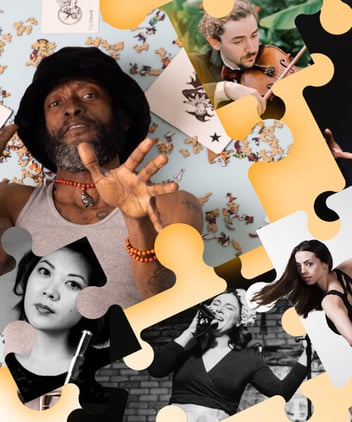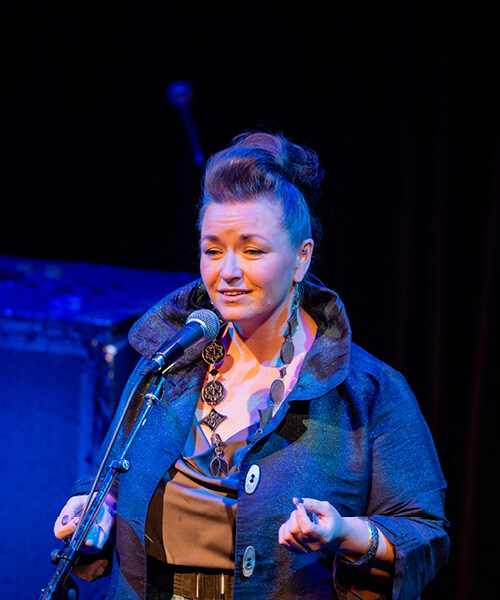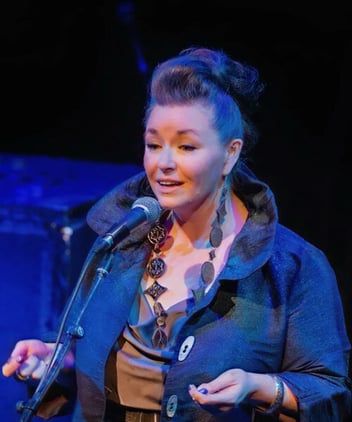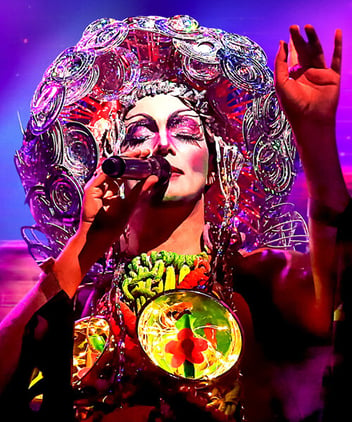
Let me start by setting the stage: My name is Shone Thistle, I am a writer, poet and multidisciplinary artist. I am also Calgary’s 7th Poet Laureate and was invited by Arts Commons to commemorate World Poetry Day by writing about my practice and what poetry means to me.
I quickly realized that writing about writing feels a little bit like a tug-o-war between the magic of a big bang and naval gazing, but here goes…
I don’t remember the first poems I ever wrote. I do, however, remember the strange drawing I made on the cover of a booklet I created from them. The drawing was of a person’s head, mostly bald, middle-aged, and in the shape of a balloon, no body, just a string tied with a neat bow around the neck so the head didn’t float off into the universe. Before you get concerned about my psyche I should tell you the drawing was the result of a classroom assignment on surrealism - perhaps influenced by my parents’ recent divorce and my own untethered feelings at the time. Funny this memory should pop up now; my father just died in December and my mother passed away on December 31, 2010. Despite having complex relationships with them both and being fiercely independent, I find myself feeling once again feeling untethered. My goodness we are meaning making machines, aren’t we!?
But I digress, back to the poetry. For as long as I can remember, writing, stories and poetry have been my way of making sense of things. Of holding memory. Of listening to the world and trying, in some small way, to answer.
My Writing Process (Or Lack Thereof)
People ask about my writing process, and the fact is - I don’t have one. I have habits, I have rituals, but mostly I watch and I listen. Some days, a line or a phrase appears out of nowhere and demands to be written down. Other days, I have to go looking through memories, books, nature, and often through my own silence. Some days aren’t meant for writing at all. I am often heard saying that I need to develop more discipline around my writing – we’ll see if that ever comes to fruition.
I write in journals, and type and record thoughts into the notes app on my phone. I scribble on scraps of paper and all too often lose them. I write in the spaces between things. Some people have smoke breaks, I’ve always used the pull of a poetic hook to pause and sometimes invest in a good midday rabbit hole. I write best when I stop worrying if the words are “good enough” and just let them come. So much of what I write is messy and often unfinished. Pro tip - people hate it when you share an unfinished poem – do it anyway. Second pro tip – I was recently asked what the difference was between a good poem and a bad poem; if there is such a thing, I think it’s editing, ruthless editing.
Poetry is about paying attention—to the people and places that shape us, the chosen family who take us under their wing, the towns we grew up in, the cities we danced in, the rivers, lakes, wetlands, and forests that call to us. It’s the histories we inherit and the futures we try to carve.
Truth as Lifeline
Poetry isn’t just metaphor or words woven into whimsical tapestries. It’s about truth. Not the vague, slippery kind that bends to comfort, but real truth. Factual truth. The kind that keeps us sane when the world insists on gaslighting itself into oblivion. The stories and poetry we write today will someday be glimpses into the realities of our time—and in a world drowning in misinformation, that matters.
We live in an era where information is both abundant and dangerously manipulated. Where entire industries profit off confusion, and where people are encouraged to pick their own “version” of reality as if facts were items on a buffet. In a world like this, reading and writing aren’t luxuries, they’re survival skills. They sharpen our ability to see through the noise, to name what is real, to hold onto something solid when the ground beneath us keeps shifting.
Poetry, story and writing are instruments in our toolbox of sanity and social justice. Poetry reminds us that language has weight, that words can be weapons, that stories shape the world we live in. Writing isn’t just an act of self-expression. Writing is an act of resistance against the forces that would prefer we stay silent, confused, and compliant.
When I write, I am always searching for something true. Something undeniable. Whether it’s the way water moves, the way grief sits in the body, or the way love makes us reckless and brave all at once. I write because I refuse to let the truth become optional. Because the world is loud with distraction, and poetry insists on listening.
The Current Calling
There are riffles and runs that find their way into my writing, often alluding to the interconnected nature of all life on this planet. Sounds beautiful, right? But not always. I was taught early to question things—to understand that ‘why’ isn’t an optional word; it’s one we all have a responsibility to use.
Why invites us to wade into the mess, into the complicated nature of our existence, to build empathy without giving ourselves or others an excuse for the impacts of our behaviour. Truth is our gateway to why, because we can’t ask the right questions until we are clear about what is actually happening around us. I think we are living in a time when artists and poets are called upon to act in currents; to withdraw, gather, unite and empower the people. And to do it iteratively so that rest and rage balance each other like conditioning for an ultra-relay marathon. And if that sounds daunting, don’t stress too much, none of it matters without joy, so don’t leave that stuff on the cutting room floor.
I write first for myself, but not only for myself. I write from the wave tips and sometimes the undertows I find myself experiencing, for the voices inside those moments that don’t always get heard, and for the stories that I believe need telling. I am careful not to tell stories that don’t belong to me. I write about queerness, resilience, trauma, and about love that refuses to be boxed in. I write about the landscapes that have shaped me, from the coastal forests of my childhood to the prairies I now call home.
And I write because words can be both a salve and a form of resistance. Because poetry has always been political. Because when we claim space and when we put our stories into the world we are saying, we are here. We have always been here. We will not be erased.
The Heart of It
At the end of the day, poetry is one of the few things in life that makes me feel both grounded and free at the same time. It reminds me that words have power, that stories matter, that we are all just trying to make sense of being here..
So I keep reading poetry and writing it. Even when it’s hard. Even when I don’t know where a poem is leading me. I write because it’s how I move through the world. And if my words find their way to someone who needs them; if they land like rain on thirsty soil; if they remind someone, even for a moment, that their experience is valid or that they belong; then that is enough.
Shone Thistle (she/they) is a writer, poet and multidisciplinary artist. They are Calgary’s 7th Poet Laureate and they were invited by Arts Commons to commemorate World Poetry Day by sharing a little bit on their writing practice, and what poetry means to them.
World Poetry Day is celebrated on 21 March, and was declared by UNESCO (the United Nations Educational, Scientific and Cultural Organization) in 1999, "with the aim of supporting linguistic diversity through poetic expression and increasing the opportunity for endangered languages to be heard".[1] Its purpose is to promote the reading, writing, publishing, and teaching of poetry throughout the world and, as the original UNESCO declaration says, to "give fresh recognition and impetus to national, regional, and international poetry movements".
Shone Thistle
Shone Thistle is a Queer poet and multidisciplinary artist. Once described as a “feminist folk poet,” Shone’s poetry credits range from radio to jazz concerts, festivals to conferences. Shone played an integral role in brokering Calgary’s first permanent Pride and Trans crosswalks and was an active voice in the establishment of Canada’s strongest municipal bylaw against conversion therapy. Her superpower is taking disparate content and weaving it into a cohesive story.




